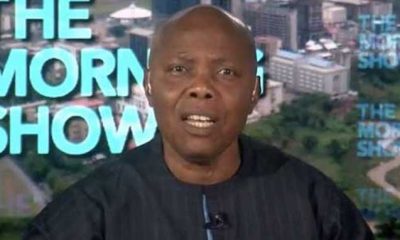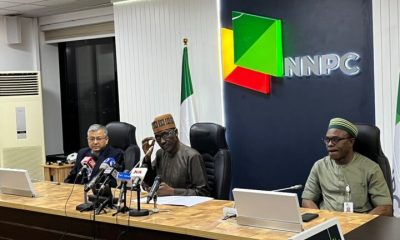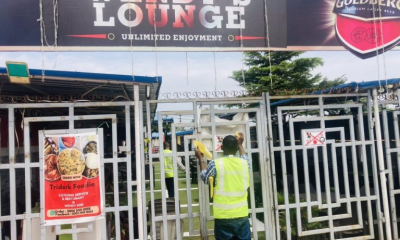Business
Nigeria now third largest oil producer in Africa, says OPEC

The Organisation of the Petroleum Exporting Countries (OPEC) says Nigeria’s oil production declined in July 2023, making the country the third largest oil producer in Africa.
In its latest monthly report for August, the global oil cartel said Nigeria’s oil production decreased to 1.081 million barrels per day (bpd) in July 2023.
In the same month, Libya produced 1.173 million bpd, Angola produced 1.149 million bpd, and Algeria produced 955,000 barrels bpd, respectively.
According to the report, in June 2023, Nigeria’s oil output, which stood at 1.249 million bpd, surpassed Libya and Angola — making it Africa’s largest producer.
However, the country’s production suffered a huge decline of about 168,000 barrels bdp in the following month, falling two places to the third position.
“Total OPEC-13 crude oil production averaged 27.31 million bpd in July 2023. Lower by 836,000 bpd month-on-month,” the report said.
“Crude oil output production declined mainly in Saudi Arabia, Libya, and Nigeria, while production in Iran, Angola and Iraq increased.”
The OPEC report further said world oil demand in 2023 was expected to grow by 2.4 million bpd, but has remained unchanged from July’s assessment.
NON-OPEC OIL SUPPLY TO EXPAND BY 1.5MILLION BPD IN 2023
Meanwhile, the report said non-OPEC oil supply is expected to expand by 1.5 million bpd in 2023.
This, the group said, is a slight upward revision from the previous assessment of 1.4 million bpd.
But for 2024, non-OPEC oil production is projected to grow by 1.4 million bpd, unchanged from the previous assessment, according to the report.
“For 2024, the main drivers for liquids supply growth are expected to be the U.S, Canada, Guyana, Brazil, Norway and Kazakhstan, mainly due to existing project ramp-ups,” it added.
“The largest declines are expected from Mexico and Azerbaijan.
“OPEC natural gas liquids (NGLs) and non-conventional liquids are forecast to grow by 46,000 bpd in 2023 to an average of 5.4 million bpd and by another 65,000 bpd to an average of 5.5 million bpd in 2024.”
NIGERIA’S ECONOMY REMAINS AT 2.4%
Speaking on the challenges in Nigeria, OPEC the country’s economic growth in the first quarter (Q1) of 2023 stood at 2.4 percent year-on-year (y-o-y), a decline from 3.6 percent recorded in the fourth quarter (Q4) of 2022.
The oil cartel said the development was an indicator of this year’s anticipated slowdown as high inflation continues to burden Nigeria’s economy.
“Inflation data for June shows an ongoing acceleration, with an annual rate of 22.8 percent y-o-y, following 22.4 percent y-o-y in May and 22.2 percent in April and 22 percent in March,” the report reads.
“Food inflation has been a key factor in this rise, reaching 25.1 percent year-on-year (y-o-y) in June, after 24.8 percent y-o-y in May.
“A combination of factors including conflict, the impact of climate change, population pressures, and the below-average output of the agricultural sector, exacerbated the scarcity of food resources over recent years.”
Business
NNPC announces downtime on recruitment portal over unprecedented traffic
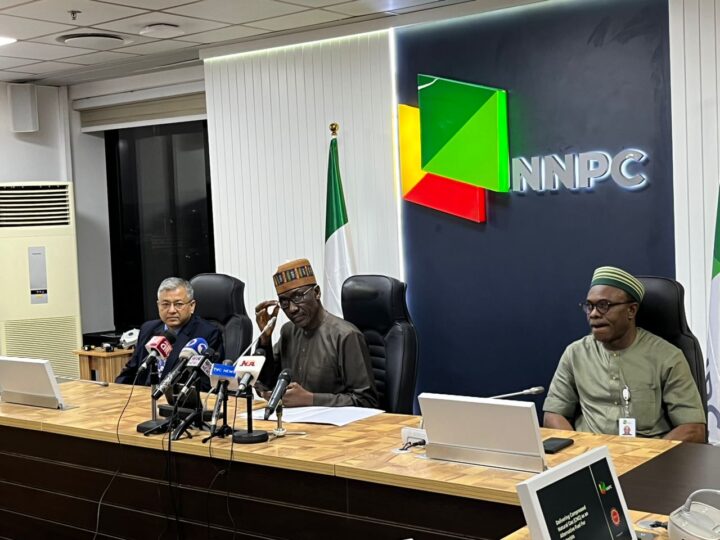
The Nigerian National Petroleum Company (NNPC) Limited has announced that its job application portal is currently experiencing downtime due to an ‘unprecedented’ surge in traffic.
On Friday, NNPC announced a recruitment exercise for qualified candidates, with the application period set to close on August 20.
Checks by Vanguard revealed that the agency’s website is displaying server error messages.
In response via X, NNPC stated that their technical team is actively working to resolve the issue.
“Due to unprecedented traffic to the NNPC Ltd. career page from applicants applying for vacancies, the site is currently experiencing slow load times,” the statement reads.
“Our technicians are working diligently to rectify the problem as quickly as possible. Please be assured that the application process deadline remains August 20, 2024.”
NNPC also reassured applicants of a transparent and merit-based recruitment process, urging capable Nigerians to take advantage of this unique opportunity.
Business
Zenith Bank seeks NGX approval to sell 5bn shares through rights issue
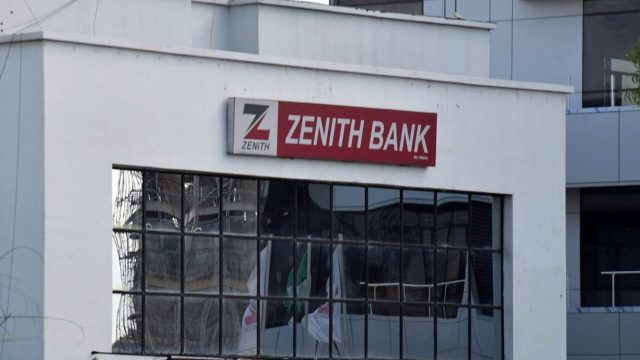
Zenith Bank Plc has sought approval from the Nigerian Exchange (NGX) Limited to sell 5.23 billion shares through rights issue to raise N188.37 billion.
According to a statement on Wednesday signed by Godstime Iwenekhai, head of the issuer regulation department at NGX, the qualification date for the rights issue is July 24.
NGX said Zenith Bank applied for the approval through Stanbic IBTC Stockbrokers Limited, the lender’s its stockbroker.
The capital market regulator said Zenith Bank plans to list a rights issue “of Five Billion, Two Hundred and Thirty-Two Million, Seven Hundred and Forty-Eight Thousand, Nine Hundred and Sixty-Four (5,232,748,964) ordinary shares of 50 Kobo each at N36.00 per share on the basis of one (1) new ordinary share for every six (6) existing ordinary shares held as at the close of business on Wednesday, 24 July 2024″.
On April 12, Zenith Bank announced plans to raise an undisclosed amount in the international and Nigerian capital markets.
According to the company, the funds shall be raised through the issuance of ordinary shares, or preference shares, whether by way of private placement, rights issue or both.
The company also said the board would propose increasing its issued share capital — from N15,698,246,893.50 to N31,396,493,787 — at the AGM.
Zenith Bank’s plan to raise capital comes after the Central Bank of Nigeria (CBN), on March 28, directed commercial, merchant and non-interest banks to increase their minimum capital requirements.
CBN adjusted the capital base for commercial banks with international licences to N500 billion, while national and regional financial institutions’ capital bases were pegged at N200 billion and N50 billion, respectively.
With a capital base of N270.75 billion, Zenith Bank needs N229.25 billion to reach the minimum capital requirement of N500 billion.
Business
‘600k households paid’ as FG resumes cash transfer scheme
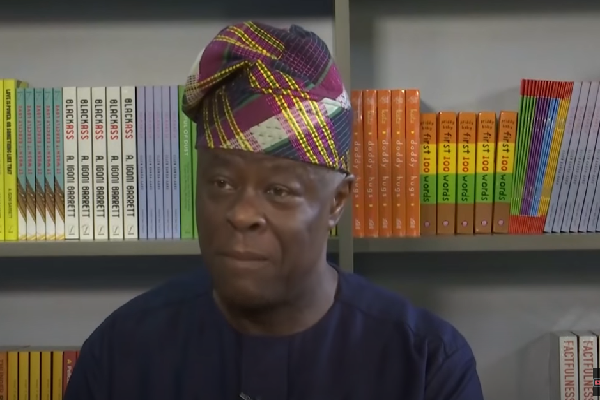
Wale Edun, the minister of finance, says over 600,000 households have benefited from the direct cash transfer programme of the federal government following the resumption of payments.
Edun spoke on Thursday in Abuja during the half-year review ministerial press briefing, themed, ‘Economic Recovery and Growth: Progress and Prospects 2024’.
On July 18, 2023, President Bola Tinubu ordered an immediate review of the conditional cash transfer scheme — an intervention initiative coordinated by the national social investment programme agency (NSIPA).
The president later suspended all programmes administered by NSIPA for six weeks, as part of a probe of alleged malfeasance in the management of the agency and its programmes.
During a radio interview session in Kaduna, Mohammed Idris, the minister of information and national orientation, disclosed the federal government’s plan to resume the intervention schemes.
Speaking at the press briefing, the minister reiterated Tinubu’s commitment to the welfare of ordinary Nigerians and the government’s efforts to ensure transparency and accountability in its social protection initiatives.
“Following the resumption of payments, over 600,000 households have already received this direct transfer this week,” Edun was quoted as saying in a statement by in a statement on by Mohammed Manga, the ministry’s director of information and public relations.
Edun said the government has made significant strides in its economic reforms, “well on its way to achieving a step-change in the revenues of the government; closely in line with the budget for 2024”.
He also announced the government’s exit from the ways and means borrowing mechanism, highlighting successes of the government’s reforms while citing a projected budget deficit of 4 percent in the 2024 fiscal year.
Edun acknowledged the temporary hardships caused by the reforms but assured that Nigerians would soon benefit from the expected outcomes.
He said the government’s “well-coordinated economic policies are beginning to yield results, evidenced by the deceleration in inflation growth, a rise in foreign investments compared to the same period last year”.
The minister said one of the major priorities of the incumbent government in the immediate term is to reduce food prices and focus on providing all the necessary support to increase local food production, given the impact of high food prices on inflation.
He said efforts are underway to achieve this goal.
The minister said with the outcome of the first half of 2024, “the economy is turning the corner.”
Edun added that with macroeconomic stability, the economy is being well positioned for sustained and inclusive growth that creates jobs, lifts millions out of poverty, and drives domestic and foreign investments that would improve the general wellbeing of the average Nigerian.
-

 Health7 days ago
Health7 days agoWhat to eat and avoid when treating malaria
-
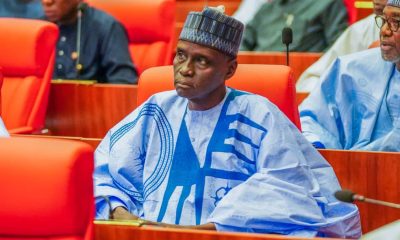
 Politics1 week ago
Politics1 week agoSenator Monguno replaces Ndume as Senate Chief Whip
-

 World1 week ago
World1 week agoComputer scientist claiming invention of Bitcoin faces criminal investigation in UK
-

 Celebrities1 week ago
Celebrities1 week agoMohbad’s wife claims Joseph Aloba is her son’s greatest enemy
-

 Politics1 week ago
Politics1 week agoAppeal court affirms Douye Diri as Bayelsa governor
-

 Politics1 week ago
Politics1 week agoActress Hilda Dokubo suspended as Labour Party’s Rivers chairperson
-

 Politics1 week ago
Politics1 week agoOndo LP Governorship candidate, Dr Ayodele Olorunfemi promises ₦120k minimum wage if elected
-

 Entertainment1 week ago
Entertainment1 week agoRema’s ‘HEIS’ sets record for biggest opening week on Spotify Nigeria in 2024



